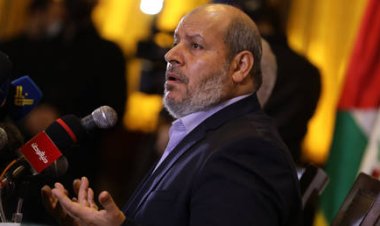Allies of Oil and Gas Industry Approve of Harris' Fracking Stance — But with Reservations
An industry advocate remarked, “There are so many other critical energy policies where the vice president’s perspective remains an open question.”

During a Thursday interview with CNN, Harris reaffirmed her current opposition to the fracking ban she had advocated for during her 2019 presidential campaign. She referenced President Joe Biden’s 2022 Inflation Reduction Act, where she cast the tie-breaking vote in the Senate, as evidence of feasible progress in climate change and clean energy efforts. “What I have seen is that we can grow and we can increase a thriving clean energy economy without banning fracking,” she stated.
Fossil fuel proponents reacted positively to Harris' comments, but many emphasized the need for clarification on her views regarding various energy issues. Dustin Meyer, head of policy at the American Petroleum Institute, said, “Obviously it’s great that she has reversed her position on hydraulic fracturing,” but added that many other critical energy policies remain ambiguous, urging the vice president to provide more detail about her overall vision for U.S. energy.
Areas of uncertainty in Harris’ energy agenda include her stance on pollution limits promoting electric vehicle purchases, strategies for overcoming congressional gridlock on energy permits, and her position on Biden’s moratorium on new natural gas export approvals, according to Meyer.
Environmental advocates also expressed skepticism while continuing to support her. Jim Walsh, political director of Food & Water Action, remarked, “We’re disappointed that Harris has equivocated on the fracking issue, but overall, the gulf between her and Trump on matters of protecting our environment and climate couldn’t be wider.”
Harris has been refining her message on fracking, a practice that has significantly boosted fossil fuel production in states like Pennsylvania, North Dakota, and Texas, making the U.S. a leading oil and natural gas producer. In past weeks, her campaign pointed to the country’s energy production record under Biden as a key talking point.
In her CNN interview, however, Harris shifted focus from that narrative, asserting that her values remain unchanged since 2019, when she supported a fracking ban and the progressive climate initiative known as the Green New Deal. “I have always believed, and I have worked on it, that the climate crisis is real, that it is an urgent matter to which we should apply metrics that include holding ourselves to deadlines around time,” she explained.
Moreover, she stated that with the Inflation Reduction Act, “we have set goals for the United States of America and by extension the globe around when we should meet certain standards for reduction of greenhouse gas emissions,” even though the IRA does not establish specific emissions reduction targets. Predictions indicate it could lead to a potential 40% cut in U.S. greenhouse gas emissions by 2030.
The IRA contains provisions that favor oil and gas, such as requiring the Interior Department to proceed with offshore lease sales previously canceled by the Biden administration and mandating that it continue issuing leases for both onshore and offshore oil development before approving more renewable energy projects. Harris highlighted this achievement, noting her role in casting the tie-breaking vote to increase fracking leases.
Fracking remains a contentious issue in Pennsylvania, the second-largest natural gas-producing state and a key battleground for Harris’ campaign for the presidency. Trump has continuously criticized her on fracking and related energy topics and planned a rally in the state shortly thereafter.
Many advocates for fossil fuels are seeking further clarity on Harris’ energy policies. Tim Tarpley, president of the Energy Workforce & Technology Council, stated, “The clarity I would like to see is her to go beyond saying ‘I’m not going to ban fracking.’” He expressed a desire for her to demonstrate support for energy production in the U.S. rather than just reiterating her opposition to banning fracking.
Kathleen Sgamma, president of the Western Energy Alliance, criticized Harris’ portrayal of the IRA’s oil and gas provisions, stating, “The Biden-Harris Administration has used the IRA to ratchet down leasing to ensure they offer only a bare minimum.”
Some environmentalists expressed that her latest stance falls short of what is necessary to combat the climate crisis effectively. Collin Rees, political director of Oil Change U.S., said, "Vice President Harris’ comments were disappointing and a far cry from the real climate leadership we need."
On the other hand, Rep. Jared Huffman (D-Calif.), a leading climate advocate, expressed support for Harris’ position, deeming the uproar over it a “sideshow.” He emphasized that the priority should be on transitioning to a clean energy economy as swiftly as possible, rather than focusing solely on banning fracking.
RL Miller, president of Climate Hawks Vote, agreed with Harris, suggesting that her comments reflect a nuanced understanding of the energy landscape, especially in historically fracking-heavy regions like Pennsylvania. “Kamala gets that,” she said, adding that the Inflation Reduction Act sets the stage for vital advancements in clean energy.
Prior to the interview, Harris’ campaign had generally avoided discussing specifics regarding her flip-flop on fracking, preferring to highlight the country’s record energy production under Biden. When questioned about her change of heart, campaign spokesperson Michael Tyler redirected attention to the administration’s success in boosting American energy production.
Trump’s campaign, however, is determined to undermine any credit Harris might receive for the increase in production. David Bernhardt, former Interior secretary under Trump, argued that current production rates are still lower than what would have been anticipated under Trump’s policies, saying, “While production has increased, the reality is that production is actually below what would have occurred under the policies of President Trump.”
Experts suggest it’s strategic for Harris to emphasize oil and gas achievements, as it aligns with her broader narrative of reducing inflation and consumer costs. Paul Bledsoe, a lecturer in environmental policy at American University, noted, “Natural gas prices have stayed incredibly low during the Biden-Harris term, and that’s been a real bright spot, not just for consumers but for manufacturing.”
Reporter Emma Dumain contributed.
A version of this story first appeared in E&E News' Greenwire.
Aarav Patel contributed to this report for TROIB News
Find more stories on the environment and climate change on TROIB/Planet Health












